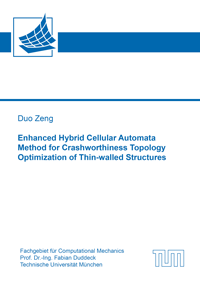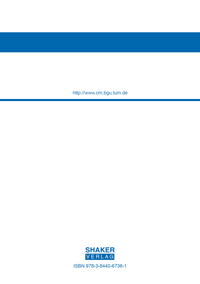
Shop : Details
Shop
Details
45,80 €ISBN 978-3-8440-6736-1Softcover152 pages60 figures224 g21 x 14,8 cmEnglishThesis
June 2019
Duo Zeng
Enhanced Hybrid Cellular Automata Method for Crashworthiness Topology Optimization of Thin-walled Structures
The optimization of structures is of great importance for automotive crashworthiness because lightweight design leads to energy savings and reduction of emissions together with assured safety levels. Hybrid Cellular Automata (HCA) is an attractive candidate solution due to their gradient-free design update, fast development of the structure, and ability to handle a large number of design variables without significant increase in numerical effort. This thesis proposes an improved HCA for crash optimization regarding each thin wall as a single cell in contrast to most of the existing approaches where each finite element is considered as cell. Besides algorithmic developments improving convergence and efficiency, adaptations are realized to analyze the influence of more realistic material models (plasticity and failure) and first steps towards crash topology optimization for additive manufacturing structures are shown.
Keywords: Topology optimization; Crashworthiness; Thin-walled structures; Hybrid cellular automata
Schriftenreihe des Fachgebiets für Computational Mechanics
Edited by Prof. Dr.-Ing. Fabian Duddeck, München
Volume 9
Available online documents for this title
You need Adobe Reader, to view these files. Here you will find a little help and information for downloading the PDF files.
Please note that the online documents cannot be printed or edited.
Please also see further information at: Help and Information.
Please also see further information at: Help and Information.
| Document |  | Document | ||
| Type |  | |||
| Costs |  | 34,35 € | ||
| Action |  | Purchase in obligation and download the file | ||
| Document |  | Table of contents | ||
| Type |  | |||
| Costs |  | free | ||
| Action |  | Download the file | ||
User settings for registered online customers (online documents)
You can change your address details here and access documents you have already ordered.
User
Not logged in
Export of bibliographic data
Shaker Verlag GmbH
Am Langen Graben 15a
52353 Düren
Germany
Am Langen Graben 15a
52353 Düren
Germany
Mon. - Thurs. 8:00 a.m. to 4:00 p.m.
Fri. 8:00 a.m. to 3:00 p.m.
Fri. 8:00 a.m. to 3:00 p.m.
Contact us. We will be happy to help you.



